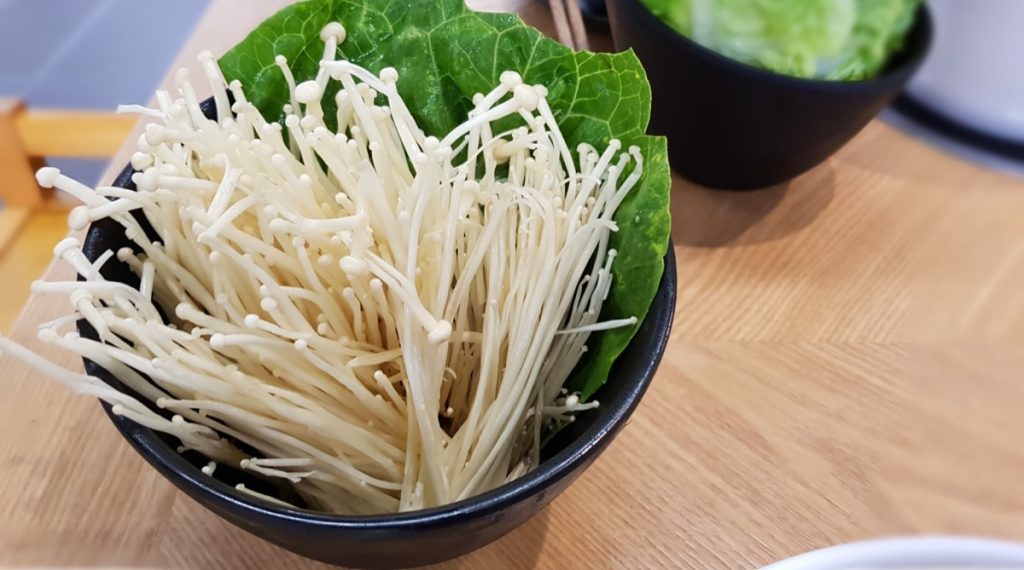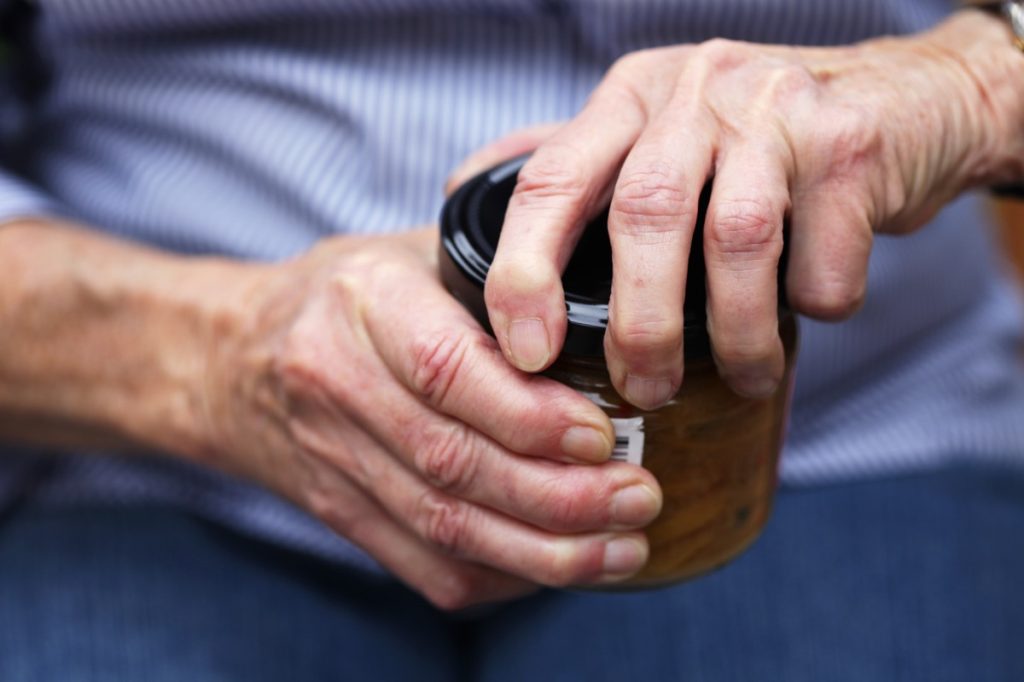New FDA Recalls: Seafood, Mushrooms, Condiments, and Eye Ointment

There are plenty of rules and regulations in place to keep potentially dangerous foods, beverages, and medicines off the market in the U.S. However, safety oversight doesn’t stop after a product is distributed to stores and retailers. Agencies like the Food & Drug Administration (FDA) keep their eye on any items that could pose a public health risk even after they’ve made their way onto shelves. And now, the FDA has issued recalls on several products, including seafood, mushrooms, condiments, and eye ointment. Read on to learn more about the agency’s latest batch of announcements.
READ THIS NEXT: Popcorn Sold In 9 States Recalled Over Health Concerns, FDA Warns.
The agency just announced a recall for seafood sold at Walmart and other major grocers.

On Feb. 26, the FDA announced that New York-based Kawasho Foods USA had voluntarily recalled cans of its Geisha Medium Shrimp sold in 4-ounce cans. The affected items were sent to major stores across California, Utah, Arizona, and Colorado, including Walmart, Associated Foods, Stater Bros Markets, Safeway, and Albertsons. Customers can identify the recalled seafood by checking cans for the UPC 071140003909, lot code LGC12W12E22, and “best by” date of May/12/2026, printed on the bottom of the package.
The company warns that it received reports of the recalled cans “swelling, leaking, or bursting.” This could mean the item was underprocessed, “which could lead to the potential for spoilage organisms or pathogens.” Customers are advised not to eat the product—even if it doesn’t appear to show signs of spoilage—and to return it to its place of purchase for a full refund.
Another company is pulling cases of enoki mushrooms from shelves due to contamination fears.

Mushrooms can be a crucial ingredient in everything from soups to side dishes, but you might want to double-check what’s in your fridge if you recently bought some. The FDA announced on Feb. 24 that California-based Jan Fruits Inc. had recalled all cases of its enoki mushrooms in 200g/7.05oz packages. The company says the affected product was sent to “small local produce distributors or wholesalers” in California for further distribution to retailers across the state, as well as Hawaii.
The affected mushrooms are sold in a clear plastic package with the description “Taiwan Best Quality Enoki Natural Mushroom***Manufacturer: Changhua County Mushrooms Production Cooperative” printed in English. Customers can also look for UPC 851084008358 on the back of the product and the word “Premium” printed in green alongside two QR scan codes.
The company says it pulled the product after routine sampling conducted by Hawaiian officials came back positive for Listeria monocytogenes. The agency warns that the dangerous bacteria usually only causes short-term symptoms in most people, such as “high fever, severe headache, stiffness, nausea, abdominal pain, and diarrhea.” However, the microorganism can cause potentially deadly infections in young children, the elderly, or anyone who is immunocompromised. It can also lead to miscarriages and stillbirths for those who are pregnant.
The company says that it has so far “ceased the production and distribution of the product as we continue our investigation as to what caused the problem.” Customers are advised to return the affected item to its place of purchase for a full refund.
RELATED: For more up-to-date information, sign up for our daily newsletter.
The agency is warning that a jarred condiment poses a potential health risk to people with allergies.

On Feb. 22, the FDA announced that Pennyslvania-based Sunny Dell Foods, LLC had recalled 12-ounce jars of its Rao’s Homemade Brand Roasted Red Peppers with Portobello Mushrooms. The company says it distributed the product to retail stores across the Northeast U.S. and to customers through mail orders placed online.
Customers can identify affected jars by locating the lot code SD21160-03 RPOA printed on top of its cap and the UPC 747479001106. The company specified that no other lots of the product—or any other soups or sauces sold under the Rao’s Homemade brand—are affected by the recall.
According to the FDA’s notice, the company pulled the product from shelves after discovering it could contain undeclared pine nuts. The known food allergen is classified as a tree nut, with the agency warning that anyone with an allergy or severe sensitivity to the ingredient “run the risk of serious or life-threatening allergic reaction if they consume these products.”
After an investigation, the company said it discovered a labeling error that meant jars packaged as roasted peppers and portobello mushrooms actually contained a condiment that contains tree nuts. Customers can receive a full refund by returning the product to the store where it was purchased.
Another company has just pulled an eye ointment from the market over potential contamination concerns.

It’s not just food items that have been recently red-flagged in one of the agency’s announcements. On Feb. 24, the FDA announced that Global Pharma Healthcare had voluntarily recalled some of its Artificial Eye Ointment distributed by Delsam Pharma. The company says the product is used “as an eye lubricant and to relieve dryness of the eyes” and contains mineral oil 15 percent and white petrolatum 83 percent as listed ingredients. The affected item is packaged in white aluminum tubes sold in a white paper carton, both of which are printed with the NDC 72570-122-35 and UPC 3725700122353.
The company says it pulled the product “due to possible microbial contamination,” adding that the items may have leaking or damaged packaging. The notice warns that using the recalled ointment “may cause adverse events, including infection in the eye that could lead to blindness.”
According to the agency’s notice, customers who purchased the recalled ointment are advised to stop using it immediately and to discard it “safely and appropriately.” Anyone who believes they’ve developed health problems from using the product should contact their doctor or healthcare provider as soon as possible.
The latest recall comes just weeks after Global Pharma Healthcare issued a previous recall for 10 different brands of artificial tears eye drops. The FDA and Centers for Disease Control and Prevention (CDC) said a joint investigation had connected the products to an “extensively drug-resistant” strain of Pseudomonas aeruginosa bacteria. By the time the recall was announced on Feb. 1, the agencies reported that 55 patients across 12 states had been infected, reporting symptoms such as eye inflammation, respiratory infections, urinary tract infections, and sepsis.